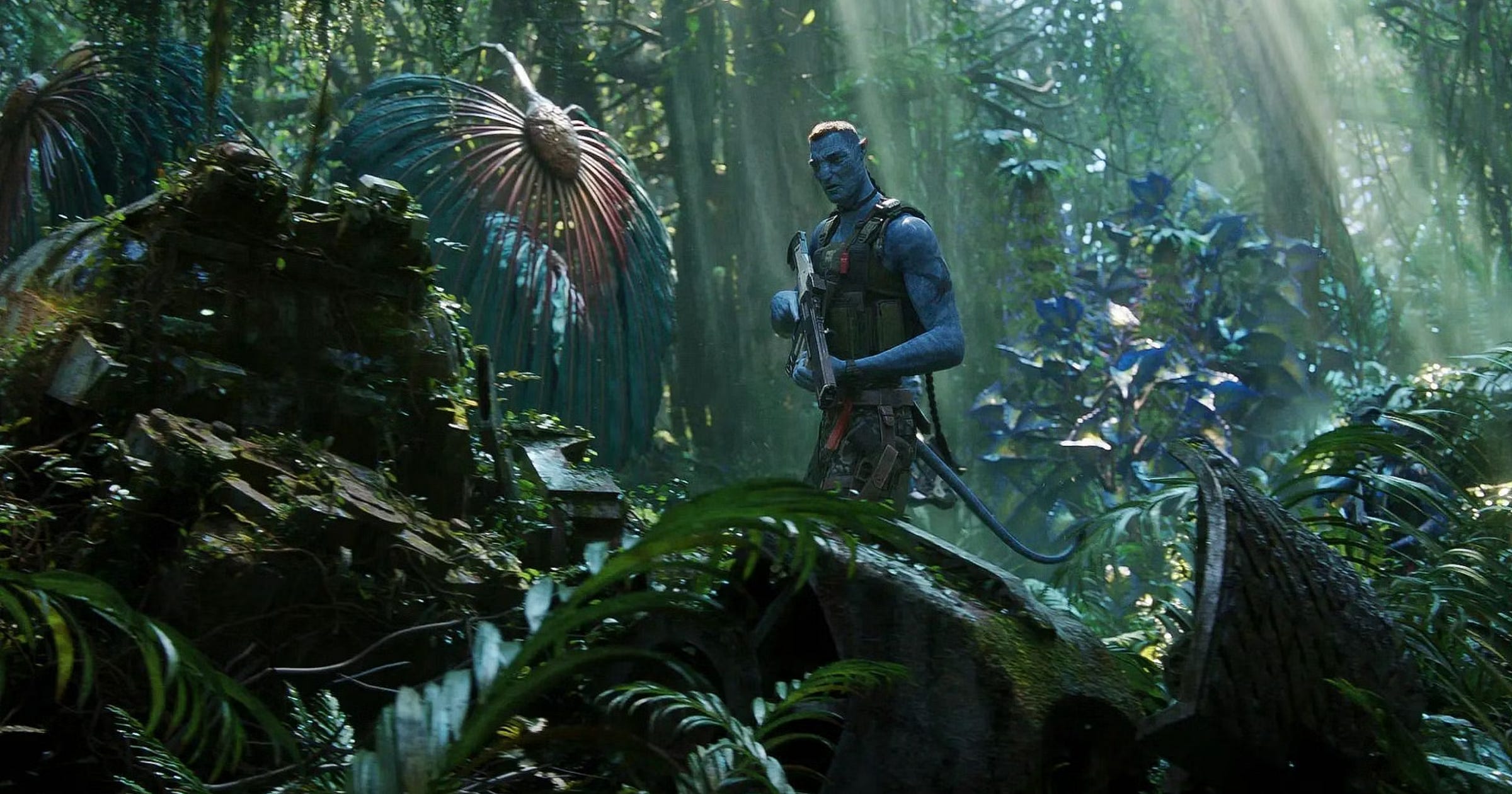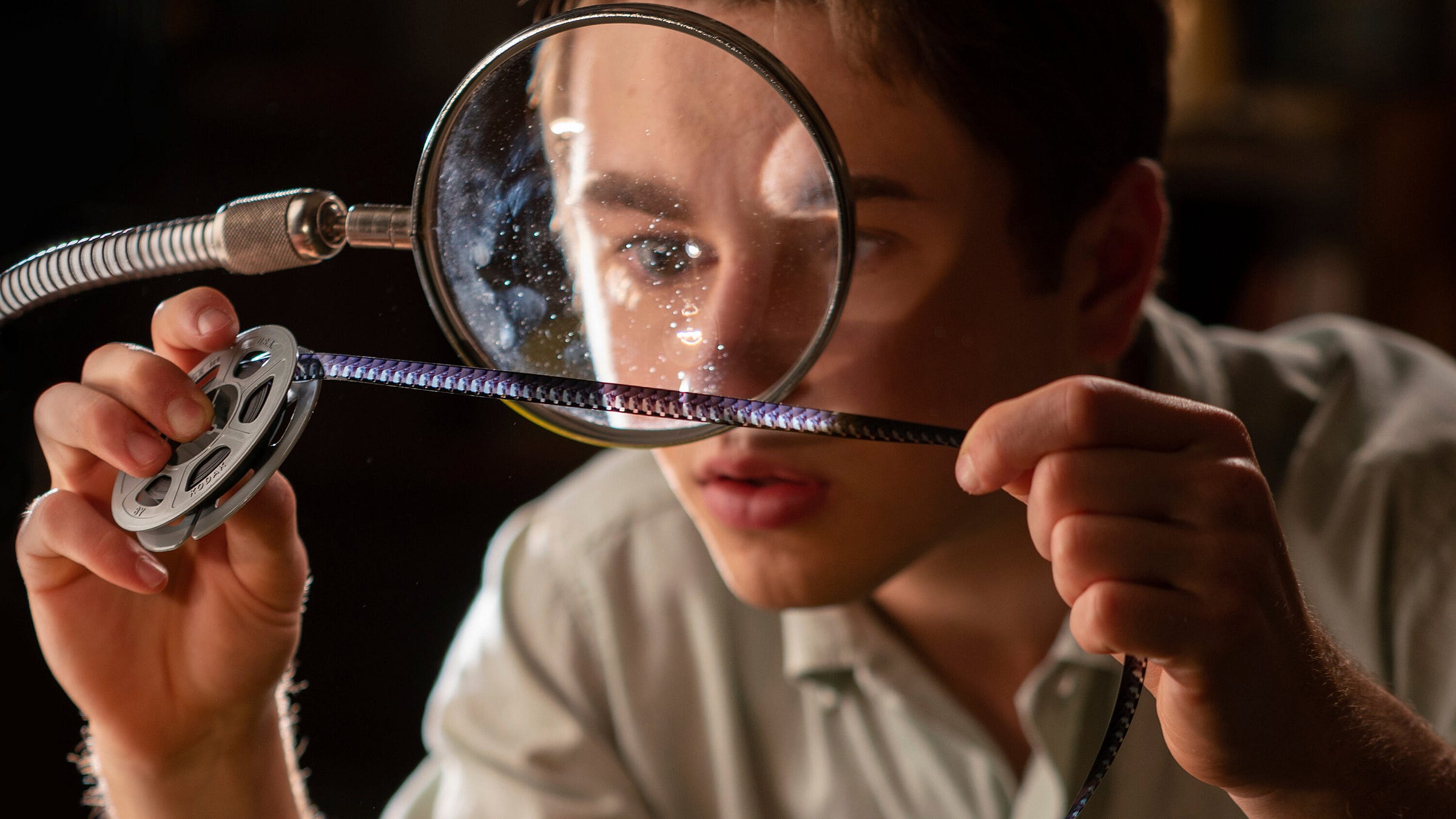PSA: Oscars are in a week and change folks! If you are still chugging through the Best Picture nominees (or, god help you, every single Oscar-nominated movie), you’re officially in the final period now.
To help guide your viewings, we’ve got two more Best Picture nominees in the newsletter today: first up, Zosha on the very specific pleasures of Avatar: The Way of Water; then Cate on Spielberg’s semi-biographical The Fabelmans. Will one of these take home the little gold guy next Sunday night? Who’s to say, we’re just movie yelling!
Zosha on Avatar: The Way of Water
What is there to say about Avatar: The Way of Water that hasn’t already been said at this point in the cycle? Quite literally I just went to check, and the brief introduction I was envisioning here — about how the story is fine and the visuals are sometimes truly spectacular; classic Jimmy C! — is almost word for word what I wrote in our final issue of 2022. Consistency is a virtue, for both me and James Cam.
But Avatar 2 has its more perverse pleasures (a movie with that runtime would have to) and against the odds it’s the smaller beats of the epic movie that have stuck with me. One in particular: Early on, as Jake Sully and his family are still with the Omatikaya clan (the way of Avatar 1), Colonel Miles Quaritch (Stephen Lang) and his team of Avatar’d goons have landed on Pandora. As they make their way through the forest, the military team stumbles on the skeletal remains of a human solider. They’re struck for all the reasons one would be, and then for one in particular, when Quaritich looks at the paint on the side of the mech suit and sees his own name.
It’s a bit of Pandora Gothic that I simply adored. Here were these Recombinants (Na’vi avatars implanted with the memories of humans who have died, keep up) being confronted with the remnants of their humanity. The foliage of Pandora has grown over him, like he’s a post-apocalyptic Rip van Winkle, and in his swirl of emotions, Quaritch crushes his literal skull, my guy!
No part of me really thought Oh this is gonna be the movie now, the thought of more gothic confrontations with death delighted me still. That’s not the movie that Cameron was writing, by any means; this scene here is a neat illustration of the series’ interrogation of identity and belonging, but the general gothic aesthetic is at odds with the vibrant Pandora palette.
Or at least it would be except that I think about it all the time. And in a very clumsy way drafted some offerings for Jimmy Cams should he want to lean into for the next 3-6.5 Avatar movies should he want a totally new aesthetic for no functional reason. (They might not even be true gothic, but then again, what is?)
The Hometrees start to grow closer and closer together and block out the sun. It’s so dark that the bioluminescence starts to fade in certain nooks of the forest. Lo'ak likes to sit in those dark spaces so he can think about his brother, until one day he sees his brother’s eyes staring back at him from the dark.
Kiri keeps hearing a ghostly wailing from under the sea, but when she goes to investigate she can’t find a source. When she asks Eywa to show her where the cries are coming from she’s met with silence.
The Metkaniya clan’s encampment exists on foggy moors, but nothing else about the way James Cameron writes them is different.
Spider (whom I loathe) kills his Recombinants!dad — why not? And yet still, sometimes, when he’s in the house and the rest of the Sullys are asleep, he swears he hears the static of his dad’s earpiece coming from beneath the corner of the hut.
Since Cameron is apparently going to keep Worthington in the fold (I thought Avatar 2 might be a way to write in the next generation, but then he also cast Sigourney Weaver [queen] as a 14-year-old, so who knows anymore) we may as well just lean into it and go real traditionally haunting with it: The photo that Miles shows Na’vi of Jake Sully seems to get older and older. But in the glimpses he sees in his rare brushes with Jake in battle, Jake’s stayed quite youthful.
Instead of starting the next film with a weird summation of the 20 or so years since the last movie, we get a letter being read in voiceover by some stranger. In the desert (where Cameron is maybe [sure] thinking about setting future movies) he’s run into a Na’vi doctor by the name of Frankenstein (public domain), who tells him about some bizarre artificial human avatars he’s made.
OK picture Tom Hiddleston as a Na’vi. Idk maybe that mental image is enough for us to remake Crimson Peak, why not there’s so many of these movies coming, eventually they gotta go to Earth.
Cate on The Fabelmans
At 76 years old, Steven Spielberg has had a long and significant run as a director. As the most commercially successful filmmaker of all time, some may even say that he is unmatched in the medium's history. But with The Fabelmans, Spielberg takes his viewers back to the origins of his career, using a parallel family to work through his relationship with his own.
In some ways, The Fabelmans is a movie about making The Fabelmans. It may seem counterintuitive, but the film is essentially a record of its own existence — a retelling of why Spielberg needed to create stories in the first place. Several critics have complained that the film feels too insular and frozen in time. Why were we invited into an old man’s therapy session? But to ask that question is to misunderstand the movie — it makes its function extremely clear.
In the film’s opening scenes, little Sammy Fabelman goes to his first movie with his parents. The crashing trains and cars tilted off their axes frighten him, and he replicates the action with the trainset he receives for Hanukkah. Watching his toy trains crash over and over — and filming it with his mother’s camera — help him to wrap his arms around the new big thing he didn’t understand. And that’s it. Samuel Fabelman makes movies because they help him to make sense of the world. That much of course is plainly obvious. But the error is in assuming that there was something else missing.
As he gets older, Sammy (Gabriel LaBelle) uses filmmaking as a source of comfort to his mentally ill mother, a source of hard truths about his family, and as a way to gain favor with the anti-semitic bullies at his school. By taking his life and shrinking it down to the size of a photograph, he can gain control of the new and more difficult things he encounters. With film, he has a way to put himself at a remove from the hard things in life. His life experiences become curiosities he can examine on a film strip — dissecting and rearranging them until he can metabolize them on a cellular level.
And it’s not just Sammy who experiences this in the film. Michelle Williams’ Mitzi Schildkraut-Fabelman discovers an ugly truth about herself in one of her son’s films. And the fallout is that Sammy gives up the camera for an extended period of time. Now, not only has he understood the world through his films, he’s also learned that the truth of those films have real-world consequences. As a rapper of recent ill repute once said, “no one man should have all that power.”
In the same way, that very idea explains why Spielberg has waited so long to make this film. This is the way he works through the things he cannot understand, or wants to examine. In the press, he has said that seeing his parent brought to life onscreen made him burst into tears, and it’s easy to see why. After nearly eight decades, he is finally taking the time to purposely turn the lens on himself, and continue his long-established penchant for investigation through film. For Spielberg, the falsity of films gives us room to tell the truth. Even this film’s title “The Fabelmans” is a not to the stories we tell ourselves about ourselves.
But The Fabelmans is also another addition to the “magic of movies” genre. In spots, it can be cloying and obvious. But those are intentional choices — Spielberg is reflecting on his life with the hindsight of a life lived by, for and through the movies. The familiar tropes at play, and its saccharine conclusion are the tools he’s using to contextualize his relationship to his past. It almost feels like the flip side of Damien Chazelle’s ambitious flop Babylon. That film was about the excesses caused by drink, drugs and the power of a dream in Hollywood. But The Fabelmans is about what keeps us coming back, and the comfort, joy, shock, and love they can encourage. As Ebert said, “movies are like a machine that generates empathy,” and this film is Spielberg’s chance to look back, and extend empathy to the man he used to be. Because that’s the man who made him who he is today.
Assorted Internet Detritus
ZOSHA: This video essay on the best movie of 2022. What makes a good life? The Star Wars prequels were the MCU blueprint. From offline (but available online): My good friend’s incredible book on Paul Thomas Anderson you can buy now!!
CATE: We’ve forgotten how to find movies, the new Black Film Canon, the New York Times makes its priorities clear, Native American stories are changing for the better, the Last of Us is a queer uchronia and Ant-Man isn’t quite cutting it anymore.
If you’re just finding this newsletter, do us a favour and subscribe. It feeds our fragile egos. And if you’re already a loyal reader, help us out and tell a friend. Happy movie yelling!
Zosha + Cate <3
twitter:@30FlirtyFilm
instagram:@30FlirtyFilm









